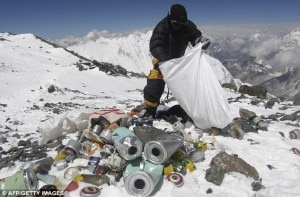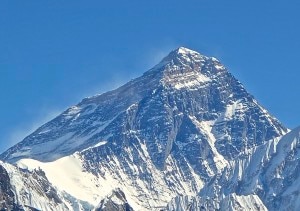Human wastage challenging Nepalese peaks: Experts

KATHMANDU, Nepal-Crystal like Nepalese Mountains are being polluted not only by the human settlement and their increased activities but also by their wastages such as feces and urine. Large numbers of rivers in Nepal are getting polluted since the peaks, the very source of water, are filled with human or bodily waste, warned mountaineering experts and environmentalist.
Human wastages have inviting big problem on the peaks since the stakeholders and mountaineer seemed little aware of its consequence, an official at the Ministry of Science, Technology and Environment told. He also stressed the need to initiate immediate measure to resolve the problem at the earliest. ‘The peaks are becoming untidy with the large number of mountaineers openly threw human waste there’, he said.
In the developed countries, mountaineers normally use ‘rest bag’ while summitting the peaks. The enzymes containing in the bag puts down virus and keep the bag from bad smell. According to Ang Tshring Sherpa, ex-president of Nepal Mountaineering Association (NMA), the government should manage such bag, which could be automatically decomposed after using it in Everest after three years. The peaks are also marred by the decayed body of the mountaineers left many days ago.
Stating that the peaks should be free from feces and urine, for which they have long been launching campaign, Sherpa said, ‘We have been using Rest top Bag through Asian Trekking Agency since 2008.’ Claiming that most of the trekking agency and expedition team here in Nepal failed to recommend for the use of such bags, Sherpa further informed that they are discussing to make use of the rest of the dump heaped in the peaks in the future.
However, an official at the Ministry of Culture, Tourism and Civil Aviation said the world’s highest peak Everest is getting cleaner in the recent past with the implementation of ‘Mountaineering Regulation 2002,’ though some people even today said the peak has slowly been transforming into a high dumping site due to human wastage and the decayed bodies of the mountaineers.

Stating that cleaning of the Everest has been enshrined in Mountaineering Regulation, spokesperson at the Ministry of Culture, Tourism and Civil Aviation Mohan Krishna Sapkota said, ‘Those trekking agencies which organized mountain expedition should bring back the garbage triggered by the mountaineers, with themselves. ‘If they are not abided by such provision, their deposit amount collected for climbing permits would not be returned’, another official at the Ministry said. The provision at the regulation has it that the concerned trekking agency organizing the mountain expedition should bring back the bodies from the Everest even if it took more than a year.
Numerous organizations have organized cleaning drive in Everest. Nepal and Indian joint army expedition, Eco Everest Group among other organizations have collected the garbage from Everest, this year as well.
‘It is necessary to ponder on whether the world’s garbage has put impact on Everest or vice versa’, an official at the mountaineering section of Tourism Ministry told. According to him, the issue of garbage on Everest will gradually resolved since the peak are becoming better cleaner hence now due to the proper management of police by the government of Nepal.
Govt to set up garbage collection office
In the meantime, government of Nepal is to set up an office at the base camp in a bid to collect and monitor the garbage from the next season. ‘The government has decided to establish the office at the base camp keeping in mind that the mere policy could not get succeeded completely to control the wastage scattering across the Everest,’ spokesperson Sapkota told. The garbage collecting drive in Everest started from 1994. The government initiated Everest Protection Campaign in 2011.
The Mountaineering regulation has categorized three types of peaks’ garbage which includes destroyable, recycling and removable. The government has introduced a new provision of handing over the collected garbage to Sagarmatha Pollution Center located at the Everest base camp.

